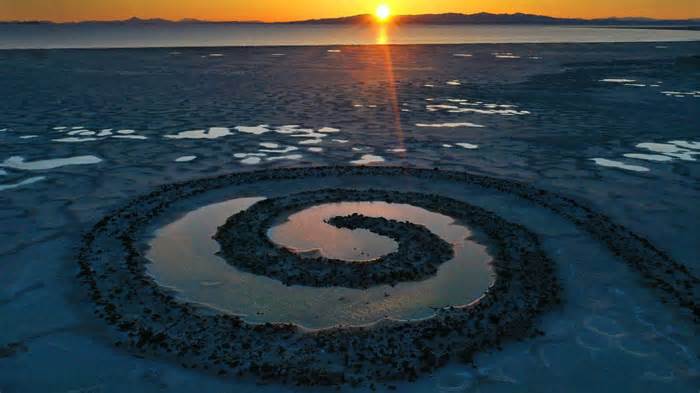Editor’s note: This article is published through the Great Salt Lake Collaborative, a solutions journalism initiative that partners news, education and media organizations to help inform people about the plight of the Great Salt Lake.
SALT LAKE CITY – Rep. Walt Brooks, R-St. George says that not long ago constituents approached him with examples of legal instances that have sprung up in other states and countries in recent years.
He referenced the story of an elephant in New York and the Komi Memem River in Brazil, while addressing members of the Utah House of Representatives Committee on Business and Labor. In either case, groups seeking to protect the animal and the body of water advocated for legal personhood to grant them rights they would not otherwise have by law.
“They were utilizing personhood as kind of arming themself to beat people over with. It’s usually attorneys and environmentalists that are trying to get that mechanism to get some ground,” he said, as he presented a proposal to counter it. “There’s ways we can preserve (the listed items) going forward, but trying to mix the idea that it’s actually a human person is not appropriate.”
Brooks crafted HB249, which would ban any government entity — legislative or court — from granting or recognizing “legal personhood” to any body of water, artificial intelligence, any inanimate object, land, real property, atmospheric gases, an astronomical object, weather, a plant, a nonhuman animal and any member of a taxonomic domain that isn’t a human being.
It was approved by the committee, which voted 13-1 in favor of the bill on Tuesday.
While Brooks said the bill wasn’t written with the Great Salt Lake in mind, environmentalists say it could damage efforts to protect the Great Salt Lake, which reached a record low in 2022.
Nan Seymour and Denise Cartwright, members of the Save Our Great Salt Lake coalition, hugged in the hallway of the Utah Capitol moments after the vote, surprised and disappointed by the outcome. Both had spoken out against the bill, as had others who cited the Great Salt Lake as an example of why it could simply be a practical tool.
“It’s possibly a concept unknown to a lot of other people and they haven’t studied what’s happening on a global scale,” Seymour said. “They don’t see how effective it is. “
The concept that anything that isn’t human can gain user status has been used in other ways, as Brooks explains. In 2022, the New York Court of Appeals ruled that Happy, an elephant at the Bronx Zoo, was not considered an illegally confined user. at the zoo, the Associated Press reported at the time.
The Nonhuman Rights Project, the organization that brought the case, argued that Happy is autonomous and cognitively complex, worthy of the same rights as anyone else. State judges decided that while Happy deserves “care and compassion,” the elephant is not a person, the outlet reported.
However, last year, the municipality of Guajara-Mirim in Brazil implemented the same concept in the Komi Memem River and its tributaries in order to protect its herbaceous areas and help the indigenous communities that rely on it.
In the case of the Great Salt Lake, Seymour said the philosophy could give the lake a higher priority when it comes to water rights, anything it has traditionally lacked. The lake receives water that is not diverted upstream, but can be assigned a precise allocation of water.
Sadie Braddock, a graduate student at Utah State University, said it’s all Utahns need to do. He presented the results of a study conducted by the university last year, which found that about 60 percent of the 436 citizens surveyed watered somewhat or heavily. human rights legislation that “discourages ‘use it or lose it’ and inspires pastoralists and farmers to rent their water. “Water rights and diverting water” to the lake.
A higher percentage responded the same when asked to replace water rights legislation to give the lake its “own water rights” so it could get more water.
“I was hoping it would have more impact,” he said after the vote, referring to the knowledge he presented. “The Great Salt Lake is strongly connected to the health and economy of Utahns. The health of the lake is our health and so it would be great to see it in action, maybe later on. “
Most of the committee members see the issue differently.
Rep. Jefferson Burton, R-Salem, said he and his colleagues are “determined” to save the Great Salt Lake, and he believes it can be done by naming it a person. Several agencies are already monitoring lake disorders and efforts to bring in more water, Brooks added.
Rep. Norm Thurston, R-Provo, said the same applies to other entities that would be included in the bill, adding that he worries it could lead to legal disaster somewhere along the way.
“Giving them the same rights as a person creates a whole morass of problems that we would now have to think through,” he said. “I really appreciate what this bill does. It says, with these problems, this is not the right tool.”
The bill now sends back to the House for a final vote in the House. No sponsor has yet been appointed in the Senate. All expenditures will need to get approval from the Utah House and Senate before the legislative consultation ends on March 1. .
If approved, the proposal would take effect on May 1.
Opponents of the bill say they will continue to oppose it this session, but their work probably won’t stop it from becoming law.
“We look at rights of nature as either a motion or a legal precedent, and I think it can be both,” Cartwright said. “We can still use our time and power to rebuild relationships in the network around us, even if the law doesn’t recognize it. “

